
Employee Maliciously Complies To Work Only His 8 1/2 Hours, Makes The Company Lose $85k Per Year
Imagine doing your best to cover your coworker’s absence and taking on extra responsibilities, only to be told you’re not supposed to leave earlier. Well, this is what happened to one Redditor who shared an incident at work on the Malicious Compliance subreddit.
After starting to work as a supervisor at a manufacturing plant, Redditor Dorky_dad77 realized that “the 2nd shift supervisor is a train wreck.” Turns out, “he leaves an hour or two early from his shift 2-3 times a week.” Being a responsible employee, the author wrote: “I come in at around 8 pm to cover the last 3 hours of his shift and my full shift. At least once a week, I just do it.”
But the new boss Sarah had her own vision of running the plant. “I’m getting a formal warning for my early departures, going into my personnel file,” the author wrote, indicating that the tension reached a boiling point. So, he makes a maliciously compliant move and starts working not a minute more than he’s supposed to. Guess if Sarah is happy.
This Redditor who works as a supervisor at a manufacturing plant has been covering his colleague’s shift and his full shift
Image credits: cottonbro
But the new boss Sarah was not happy with his early departures and filed a formal warning which went into the author’s personnel file
We reached out to Christine Mitterbauer, a licensed and ICF-approved career coach based in the UK, and asked about employees who feel pressured to work more than their scheduled hours without extra payment. “Depending on the industry they work in, this can be more or less common. If working overtime without getting compensated for the extra work is common in your industry, you’ll have a hard time to change this fact,” she explained.
“You might have to ask yourself if it’s the right industry for you, or if there’s another industry that would be better suited. If it’s, however, not common in your industry, you might have had bad luck with the company or manager,” Christine said and added that in this case, you could consider having an honest conversation with them about this fact, and explain that you need work boundaries in order to have a balanced work and personal life.
ADVERTISEMENT“Explain the value you already add to the company, and demonstrate that you’re able to add more value than perhaps other employees, without working overtime. Gather examples of this over a few weeks or months so you have a solid case.”
If an employer refuses to pay you for covering a coworker’s duties and working their hours, Christine said that you need to have an honest and direct conversation with your manager about this. “Explain that this isn’t right or sustainable, and that you need to be compensated for such extra work. Make sure you’re able to demonstrate how much value you’re already adding to the company, and explain what kind of extra work you’re willing to do, and what kind you’re not,” she explained.
And this is what people thought of this whole situation
Anyone can write on Bored Panda. Start writing!
Follow Bored Panda on Google News!
Follow us on Flipboard.com/@boredpanda!
1.9Mviews
Share on Facebook
Liucija Adomaite is a creative mind with years of experience in copywriting. She has a dynamic set of experiences from advertising, academia, and journalism. This time, she has set out on a journey to investigate the ways in which we communicate ideas on a large scale. Her current mission is to find a magic formula for how to make ideas, news, and other such things spread like a virus.
Read less »
Liucija Adomaite
Author, Community member
Liucija Adomaite is a creative mind with years of experience in copywriting. She has a dynamic set of experiences from advertising, academia, and journalism. This time, she has set out on a journey to investigate the ways in which we communicate ideas on a large scale. Her current mission is to find a magic formula for how to make ideas, news, and other such things spread like a virus.

Read more »
Denis is a photo editor at Bored Panda. After getting his bachelor's degree in Multimedia and Computer Design, he tried to succeed in digital design, advertising, and branding. Also, Denis really enjoys sports and loves everything related to board sports and water.
Read less »
Denis Tymulis
Author, Community member
Denis is a photo editor at Bored Panda. After getting his bachelor's degree in Multimedia and Computer Design, he tried to succeed in digital design, advertising, and branding. Also, Denis really enjoys sports and loves everything related to board sports and water.
I don't understand- does "salaried" in the USA just mean you get a fixed salary and in return you have to work whatever hours your boss decides and you can do nothing about it if they decide you need to work more hours? Here in the UK a 'salaried' position still has a salary based on a fixed number of contracted weekly hours.
Sounds like the perfect "American Dream". Especially when it turns out to be the "American Nightmare".
Not with every company. The private sector can pull that. But I'm salaried in the public sector and I'm forbidden to work over 40 hours per week. The worst offenders are retail companies. Managers burn out working for them.
Not necessarily. I'm salary with a maximum of 50 hours. I generally put in around 42.
In the USA if you're salary it means they can work you overtime for free.
Only if the employee allows it, though. Just say "no."
Nooooooo, no - the boss doesn't give a f**k if you 'allow it', they'll tell you your salary and are to work when told to work, no matter how many hours that entails and some ppl pull 80-120 hours a week, depending on the postion. Your opinion on the matter, ie your free time, is when you're unionized. Corporations don't give a flying f**k about their employees in the States and will work you into the ground if given the opportunity.
Yes, that is what “salaried” means in the US, though to comply with the federal Fair Labor Standards Act, salaried employees must make at least $684 per week ($35,568/year), and that amount is higher in some states.
I will give you a great example. I was a manager of a business that was open 7 days a week, of which I worked 5 days and had a part time employee who covered the other two. When my part-time employee was promoted to a full time position at another branch, I had to work 7 days a week until I could find somebody else, for zero extra pay. My worst run was three months without a day off (including having two other part time jobs I tried to fit in and being a single parent). Welcome to the capitalist worker-abusing centre of the world, the USA.
When you apply for a salaried job in the US, you must ask in the interview how many hours they expect and it is best to get that in writing. It is not a protected benefit. The US produces workers for exploitation; our whole upbringing primes us for this life. You have to figure out how to protect yourself and by getting burned, you learn how to play the angles, hopefully.
"Salaried" employees may be asked to put in additional time for no additional compensation. The rationale is that the salary exceeds the full-time hourly pay, and extra hours maybe expected occasionally. The catch is that when companies use salaries to avoid paying fair compensation, the company may be required to pay additional "salary" for excessive extra time. It's very hard for salaried workers to compel an employer to pay extra, and it usually requires a complaint to the Department of Labor and, perhaps, a court battle to get it.
Yes. It's legal indentured servitude. There are virtually no protections for salaried workers in the U.S. and our political class is fine with it.
Alright bunch of folks commenting. Gotta toss my hat in the ring. Salary legally in the USA is this. Your pay is based upon an agreed amount of time. Anywhere from 40 to 55 hours per week. Now notice the key part there based upon an agreed amount of time. Now once you meet that time and the company has further need of you they are supposed to pay for that. Notice again I said supposed to. In all my years in the service industry I have NEVER once been compensated past that agreed amount of time and I have worked over 110 hours in a week. I have worked over 6 months with no days off. Complained to my supervisor and was told to suck it up you are salary.
And this is a problem. Someone commented that you should look at your contract but... there's no contract. You just get a promotion and a hike in pay and now you're doing the job. And it's not as simple as saying 'then just don't do it'. I WANT to move up to be able to make more money. So you believe that that will happen by becoming the boss. And if everything worked perfectly then, yes, I would be making more than my hourly workers. But there were less than 6 employees, if one person called out I had to cover the shift. I wasn't given any more labor hours to hire more and I can't force people to come in. So I worked double shifts often. In my company, you're scheduled for 55 hours, and only get more pay if you go beyond 70. AND it's not at my regular pay-- at minimum wage... which was BS! But if I was covering a shift and worked an extra 8 hours, that wouldn't hit the 70 hour mark so-no extra pay. So I would work 16-18 hours in one day and not make a dime more.
Human Resources at the corporate level does whatever operations tells them to do, and fear of job loss (or departmental restructure) causes them to immediately fall in line. I knew a Store Manager at The Home Depot who would buy cold cuts, a loaf of bread and condiments on his way into work and expect that his salaried managers NOT leave the building for lunch. HR did nothing about it.
As far as my company goes, salaried means you make a set amount per annum whether you work 1 hour per week or 100.
For a start-up, I was hired on as a “contractor” instead of “employee” as I had originally been presented, so I negotiated 2 days out of the week for me to work remotely and a travel/lunch stipend. My boss also continued to treat me like a fixed-salaried employee. Closing in on a year (of working overtime), he eventually kept on complaining and pushing for me to work my full-time shift on location. (I ended up REALLY needing that time at home to work for my sanity.) In the beginning, I would meet with him and notify him that the amount of work I was given was unsustainable, and he would be very understanding and say that all I needed to do was tell him and we would figure something out. But every time I brought it up after that he would question why I couldn’t do this one extra thing, and there were numerous. When I began working in my closet at home into the wee hours of the morning so my bf wouldn’t catch me working my life away, I knew that it was time to go.
The company can actually be reported for classifying you as a contractor while requiring you to work as an employee. You are also responsible for an additional 7.5 percent of your social security as a contractor/ independent contractor.
Wait, no! Why are people saying, "yes"? Salaried positions are still bound by contracts. Sometimes people don't sign a contract, but usually that's with friends/family business. It's a poor practice, not to sign an agreement. In most positions, though, salaries still depend on contracts that outline billed hours, and expectations. So, most salaried workers sign a contract for 40 hours per week, and agree to certain benefits (vacation, sick days, 401k retirement plans, medical coverage). The problem is Americans socially push the idea that work is everything; work is *family* (shudder!!). American shame each other for reasonable work-life balance, and make people feel like if they aren't "taking one for the team," in abusive jobs, that they are lazy. Social pressure, and indoctrination of work-is-the-only-point-to-living, make workers do more than their fair share. But, legally, with salaried contacts, there are specified hours, and some companies still track hours.
You are missing the piece about 40hrs or whatever takes to get the job done. It's there in writing.
@April, That would depend on the contract. I'm not sure if what you said is common. My experience has been I'm expected to work 40 hours/week, nothing about "whatever it takes to get the job done". In my experience that part comes more so from unspoken expectations, unrealistic deadlines and societal pressure. If you think that's what's expected, I'd recommend checking your employee handbook (if you have one) or the documents you signed when you started.
I take it you're not American yourself and just wildly mis-generalizing? Because I have literally never met anyone in my working life with that attitude
As an example, a sales person who travels does not get paid for his overnight stays in a hotel but his salary and compensation should be good enough to be worthwhile to do that. Similar to someone that's in customer support for computers for their company they may get a standard salary per week with the understanding that they would take calls at night to answer questions when they are not in the office
It is usually specified that the employee work "at least" a certain number of hours...I'm sure you can see how that would be ripe for abuse.
Salaried workers do have a schedule, however being salaried is supposed to allow a manager to make the best decisions for the company. For instance, you are scheduled to work 8-5 every day, however if there's a problem that requires you to stay late or cover someone's shift, as a salaried manager it's your responsibility to handle it. Sometimes things happen that require you to stay late or catch up on work because things don't always go according to plan. "Salary" is supposed topay you so much more than hourly workers to make this extra time you put in worth it. You also can leave or come in when you want..you don't punch a clock. In a perfect world, you are also not docked any time. If you work a lot than it isn't a big deal if you leave a few minutes early as long as you aren't affecting the business negatively. Whether you are there for your whole shift or not, you get paid the same amount. If you have a doctors appt and need to be gone for an hour, or you need to go to your daughter's dance recital, you can go and not lose money. If you are sick or take a day off, you also still get paid. (1)
(2) The problem is that, more often than not, the 'problems' that require you to stay late are more frequent than the times you leave a little early or the doctor's appt you take. And in recent years the gap between salaried workers and hourly has gotten smaller making it not worth doing all the extra work of being in charge. 20 years ago, and hourly worker would make 7.25 an hour and a salaried position would be 15 an hour. Now it's closer to hourly-13 an hour, salaried-15 an hour..and the work required is also unreasonable. If you're salaried, they often give you tasks that in no way can be completed in the schedule you have. I was required to work alone my entire shift, but magically try to get schedules, orders, cleaning all done, too. It's purposely done to get more time out of the managers in order to lower their overall pay. I was supposed to be paid for 50 hours, but did almost 70. If you break down my pay I made less than the hourly workers who worked for me-- by a lot.
I worked in retail in the UK and that wasn't true, certainly not for the company I worked for. I was in a management position and things just had to get done, even if others were sick. My equivalent hourly rate was occasionally below minimum wage. Yes, it was probably illegal and I left fairly quickly but if it happened to me, I can't imagine I'm the only one.
No. We have a set contract as with everything else. However, the employer tends to break that contract and demand more. They expect us to be so afraid of losing our jobs that we will do more and work more hours. Since the pandemic the employers have had a wake up call. They can't get us to work for peanuts. Americans have remembered what a life feels like and aren't afraid to demand more.
Yes in most cases is considered "salary non- exempt", I work as "salary- exempt". So I get paid a yearly salary but get paid for my time like the hourly employee. (8 hr at regular, 8-10hr 1 1/2 pay, 10+ double time)
God forbid you have to off one day. You will get docked the average hourly rate (annual salary divided by 2080 hours) for the hours missed even though you put in extra hours at another time.
I work in an industry where some people freelance, but most choose to be on salary. Usually "salary" has general hours, but you are paid the same if you work extra. If the "extra" is a big change or the shifts are regularly or you regularly work outside the loosely outlined hours , your contract should be revisited. If you are not the manager or in charge of scheduling, you need to make management aware of any major change in hours. The reason people usually choose a salaried position is that the salary usually offers more than what you would make on a good week in equivalent hours. Also that money is guaranteed. Even if conditions lead to any temporary closures where you would not be needed for your shift, a salaried position guarantees you make the same money regardless. At this point, it sounds like the person is just sour on the job. They need to decide and organize their thoughts about how they think this issue could best be resolved. At this point in time, you don't want to lose
This comment is hidden. Click here to view.
Wilf... I'm glad you're the only one smart enough to see how fake this story is... I work in manufacturing... Manufacturing what? I also work 8 hours plus half hour lunch every day on salary. So you're on salary and you have set hours? 😂 Also the lady got really mad that I was doing an extra 3 hours every day. When you're on salary you are committed to doing an extra 3 hours every day. Or most contracts it says up to 300 hours a year. Or somewhere in between. So I've never heard of something call salary that you work 8 hours. The whole meaning of salary means you don't work by hours you work by time given inside of your contract which is usually nothing less than 60 hours a week.. most of the time you won't work those 60 hours but that's why the contract is set in case something happens... For you to say you have a supervisor that is leaving every day that doesn't have a punch out card for this giant business you're talking about is another piece of bs.. I could keep going all day.
Seriously every single point you made is in particular to your situation. Not all. Or in general. Just yours. Its not all about you though
There are alot of salary jobs that have shift hours. U just havent worked one. Doesnt mean it isnt a thing just cuz you are unaware of them. Lol smh @ the internet 😂
What I'm saying is that in the UK the majority of office jobs are salaried, but there is an expectation here that you work a fixed number of hours and that you'd be perfectly within your rights to refuse to work longer. There are certainly some professions where people feel obliged to work longer hours than their contract states, but it's considered a very bad situation. My wife, for example earns nearly 80,000 (a genuinely very high salary in the UK) and her boss tells her "if you can't get it done on 37 hours, you're doing it wrong".
This comment is hidden. Click here to view.
Most states in the U.S. have some kind of law that defines how many hours a work week is, and beyond that number you're supposed to be paid overtime. It's supposed to apply to salaried positions as well, but the reality is that many companies don't comply with those laws, and most states don't enforce them.
Incorrect. 99% of the time salaried and "Exempt" go hand-in-hand, meaning you're exempt from overtime laws of the state and Fed. This is signed upon with the New Hire documentation, and it's written into the labor laws.
There is legal authority for salaried employees to claim additional compensation when the work hours demanded routinely exceed full-time by a substantial amount. The courts have recognized that some companies use "salaried" workers in order to avoid hiring adequate staff to meet requirements. They bank on the salaried personnel working hours far in excess of full time, and the company saves money by under-hiring. In those cases, though, the salaried employees had to make complaints through regulatory agencies, and then litigate in court to collect. That's a pretty harsh way to get fair pay, really.
Yeah the odds of success are about a billion-to-one. Everyone knows what happens when you agree to join the ranks of the Salaried Exempt, and it ultimately is still a voluntary one, courts and agencies be damned. I've been part of both sides, interestingly enough at the same time for the same employer. Bonuses were still handed out at times however.
Wrong. Salaried as long as I had been salaried which is going back to the early 80s, the employee is exempt from overtime. It is stated in the employee hiring agreement they sign. I was in management, I know the rules.
"Trainwreck" guy is probably the owner's best drinking buddy or something. Have seen that happen often enough. And whoever the owner or upper manager is doesn't give the faintest crap about the damage to their reputation or company to do something about their "friend". The big lesson is, don't EVER try to care more about your company than the owner or executives do.
I never could understand management hiring their incompetent buddies for jobs. It is rampant in corporate America. I could never understand if they didn't care, owed them one or if they didn't realize the buddy was incompetent.
Load More Replies...This comment is hidden. Click here to view.
You must not have any real friends in life must not have any real friends in life
Right, someone pointing out the common sense that people may not realize (or care) that their friends are incapable when they hire them means they don't have friends. Are you one of those incapable people, or one of those who'd hire someone just because they're your friend and oh well if they make everyone else need to work harder to pick up their slack?
This comment is hidden. Click here to view.
Paul Davis it doesn't seem like he has a friend otherwise he wouldn't let that woman talk to the guy that's covering for him. This is just a fake ass story that has more holes in it than swiss cheese imy my ex-girlfriend put together
Ha ha the comment about two bosses. I worked at a place that gave me 3 different managers in 1 year and by the time I left I technically had 3 people who were my "boss". That wasn't even why I quit, just an example of their gross mismanagement. Oh yes the schadenfreude I felt when I learned they went bankrupt and closed their doors less than 3 years later...
I work at UPS and at one time I had three supervisors. Even though they were all good guys it was frustrating have 3 people tell me to do three different things. However one day as a walked about 30 feet and all three asked me to do three different things I realized this was a multiple choice problem. 😁 Which one of those things would I prefer doing! LOL When the other 2 asked why I was doing that I just said sup #3 told me to. 😄 From then on I loved having 3 sups as I could always pick the preferred job. 😀 The difference between adventure and ordeal is attitude. 🙂
Load More Replies...Really just depends on the business. I work at a youth treatment center and multiple supervisors is pretty much a necessity.
I don't understand- does "salaried" in the USA just mean you get a fixed salary and in return you have to work whatever hours your boss decides and you can do nothing about it if they decide you need to work more hours? Here in the UK a 'salaried' position still has a salary based on a fixed number of contracted weekly hours.
Sounds like the perfect "American Dream". Especially when it turns out to be the "American Nightmare".
Not with every company. The private sector can pull that. But I'm salaried in the public sector and I'm forbidden to work over 40 hours per week. The worst offenders are retail companies. Managers burn out working for them.
Not necessarily. I'm salary with a maximum of 50 hours. I generally put in around 42.
In the USA if you're salary it means they can work you overtime for free.
Only if the employee allows it, though. Just say "no."
Nooooooo, no - the boss doesn't give a f**k if you 'allow it', they'll tell you your salary and are to work when told to work, no matter how many hours that entails and some ppl pull 80-120 hours a week, depending on the postion. Your opinion on the matter, ie your free time, is when you're unionized. Corporations don't give a flying f**k about their employees in the States and will work you into the ground if given the opportunity.
Yes, that is what “salaried” means in the US, though to comply with the federal Fair Labor Standards Act, salaried employees must make at least $684 per week ($35,568/year), and that amount is higher in some states.
I will give you a great example. I was a manager of a business that was open 7 days a week, of which I worked 5 days and had a part time employee who covered the other two. When my part-time employee was promoted to a full time position at another branch, I had to work 7 days a week until I could find somebody else, for zero extra pay. My worst run was three months without a day off (including having two other part time jobs I tried to fit in and being a single parent). Welcome to the capitalist worker-abusing centre of the world, the USA.
When you apply for a salaried job in the US, you must ask in the interview how many hours they expect and it is best to get that in writing. It is not a protected benefit. The US produces workers for exploitation; our whole upbringing primes us for this life. You have to figure out how to protect yourself and by getting burned, you learn how to play the angles, hopefully.
"Salaried" employees may be asked to put in additional time for no additional compensation. The rationale is that the salary exceeds the full-time hourly pay, and extra hours maybe expected occasionally. The catch is that when companies use salaries to avoid paying fair compensation, the company may be required to pay additional "salary" for excessive extra time. It's very hard for salaried workers to compel an employer to pay extra, and it usually requires a complaint to the Department of Labor and, perhaps, a court battle to get it.
Yes. It's legal indentured servitude. There are virtually no protections for salaried workers in the U.S. and our political class is fine with it.
Alright bunch of folks commenting. Gotta toss my hat in the ring. Salary legally in the USA is this. Your pay is based upon an agreed amount of time. Anywhere from 40 to 55 hours per week. Now notice the key part there based upon an agreed amount of time. Now once you meet that time and the company has further need of you they are supposed to pay for that. Notice again I said supposed to. In all my years in the service industry I have NEVER once been compensated past that agreed amount of time and I have worked over 110 hours in a week. I have worked over 6 months with no days off. Complained to my supervisor and was told to suck it up you are salary.
And this is a problem. Someone commented that you should look at your contract but... there's no contract. You just get a promotion and a hike in pay and now you're doing the job. And it's not as simple as saying 'then just don't do it'. I WANT to move up to be able to make more money. So you believe that that will happen by becoming the boss. And if everything worked perfectly then, yes, I would be making more than my hourly workers. But there were less than 6 employees, if one person called out I had to cover the shift. I wasn't given any more labor hours to hire more and I can't force people to come in. So I worked double shifts often. In my company, you're scheduled for 55 hours, and only get more pay if you go beyond 70. AND it's not at my regular pay-- at minimum wage... which was BS! But if I was covering a shift and worked an extra 8 hours, that wouldn't hit the 70 hour mark so-no extra pay. So I would work 16-18 hours in one day and not make a dime more.
Human Resources at the corporate level does whatever operations tells them to do, and fear of job loss (or departmental restructure) causes them to immediately fall in line. I knew a Store Manager at The Home Depot who would buy cold cuts, a loaf of bread and condiments on his way into work and expect that his salaried managers NOT leave the building for lunch. HR did nothing about it.
As far as my company goes, salaried means you make a set amount per annum whether you work 1 hour per week or 100.
For a start-up, I was hired on as a “contractor” instead of “employee” as I had originally been presented, so I negotiated 2 days out of the week for me to work remotely and a travel/lunch stipend. My boss also continued to treat me like a fixed-salaried employee. Closing in on a year (of working overtime), he eventually kept on complaining and pushing for me to work my full-time shift on location. (I ended up REALLY needing that time at home to work for my sanity.) In the beginning, I would meet with him and notify him that the amount of work I was given was unsustainable, and he would be very understanding and say that all I needed to do was tell him and we would figure something out. But every time I brought it up after that he would question why I couldn’t do this one extra thing, and there were numerous. When I began working in my closet at home into the wee hours of the morning so my bf wouldn’t catch me working my life away, I knew that it was time to go.
The company can actually be reported for classifying you as a contractor while requiring you to work as an employee. You are also responsible for an additional 7.5 percent of your social security as a contractor/ independent contractor.
Wait, no! Why are people saying, "yes"? Salaried positions are still bound by contracts. Sometimes people don't sign a contract, but usually that's with friends/family business. It's a poor practice, not to sign an agreement. In most positions, though, salaries still depend on contracts that outline billed hours, and expectations. So, most salaried workers sign a contract for 40 hours per week, and agree to certain benefits (vacation, sick days, 401k retirement plans, medical coverage). The problem is Americans socially push the idea that work is everything; work is *family* (shudder!!). American shame each other for reasonable work-life balance, and make people feel like if they aren't "taking one for the team," in abusive jobs, that they are lazy. Social pressure, and indoctrination of work-is-the-only-point-to-living, make workers do more than their fair share. But, legally, with salaried contacts, there are specified hours, and some companies still track hours.
You are missing the piece about 40hrs or whatever takes to get the job done. It's there in writing.
@April, That would depend on the contract. I'm not sure if what you said is common. My experience has been I'm expected to work 40 hours/week, nothing about "whatever it takes to get the job done". In my experience that part comes more so from unspoken expectations, unrealistic deadlines and societal pressure. If you think that's what's expected, I'd recommend checking your employee handbook (if you have one) or the documents you signed when you started.
I take it you're not American yourself and just wildly mis-generalizing? Because I have literally never met anyone in my working life with that attitude
As an example, a sales person who travels does not get paid for his overnight stays in a hotel but his salary and compensation should be good enough to be worthwhile to do that. Similar to someone that's in customer support for computers for their company they may get a standard salary per week with the understanding that they would take calls at night to answer questions when they are not in the office
It is usually specified that the employee work "at least" a certain number of hours...I'm sure you can see how that would be ripe for abuse.
Salaried workers do have a schedule, however being salaried is supposed to allow a manager to make the best decisions for the company. For instance, you are scheduled to work 8-5 every day, however if there's a problem that requires you to stay late or cover someone's shift, as a salaried manager it's your responsibility to handle it. Sometimes things happen that require you to stay late or catch up on work because things don't always go according to plan. "Salary" is supposed topay you so much more than hourly workers to make this extra time you put in worth it. You also can leave or come in when you want..you don't punch a clock. In a perfect world, you are also not docked any time. If you work a lot than it isn't a big deal if you leave a few minutes early as long as you aren't affecting the business negatively. Whether you are there for your whole shift or not, you get paid the same amount. If you have a doctors appt and need to be gone for an hour, or you need to go to your daughter's dance recital, you can go and not lose money. If you are sick or take a day off, you also still get paid. (1)
(2) The problem is that, more often than not, the 'problems' that require you to stay late are more frequent than the times you leave a little early or the doctor's appt you take. And in recent years the gap between salaried workers and hourly has gotten smaller making it not worth doing all the extra work of being in charge. 20 years ago, and hourly worker would make 7.25 an hour and a salaried position would be 15 an hour. Now it's closer to hourly-13 an hour, salaried-15 an hour..and the work required is also unreasonable. If you're salaried, they often give you tasks that in no way can be completed in the schedule you have. I was required to work alone my entire shift, but magically try to get schedules, orders, cleaning all done, too. It's purposely done to get more time out of the managers in order to lower their overall pay. I was supposed to be paid for 50 hours, but did almost 70. If you break down my pay I made less than the hourly workers who worked for me-- by a lot.
I worked in retail in the UK and that wasn't true, certainly not for the company I worked for. I was in a management position and things just had to get done, even if others were sick. My equivalent hourly rate was occasionally below minimum wage. Yes, it was probably illegal and I left fairly quickly but if it happened to me, I can't imagine I'm the only one.
No. We have a set contract as with everything else. However, the employer tends to break that contract and demand more. They expect us to be so afraid of losing our jobs that we will do more and work more hours. Since the pandemic the employers have had a wake up call. They can't get us to work for peanuts. Americans have remembered what a life feels like and aren't afraid to demand more.
Yes in most cases is considered "salary non- exempt", I work as "salary- exempt". So I get paid a yearly salary but get paid for my time like the hourly employee. (8 hr at regular, 8-10hr 1 1/2 pay, 10+ double time)
God forbid you have to off one day. You will get docked the average hourly rate (annual salary divided by 2080 hours) for the hours missed even though you put in extra hours at another time.
I work in an industry where some people freelance, but most choose to be on salary. Usually "salary" has general hours, but you are paid the same if you work extra. If the "extra" is a big change or the shifts are regularly or you regularly work outside the loosely outlined hours , your contract should be revisited. If you are not the manager or in charge of scheduling, you need to make management aware of any major change in hours. The reason people usually choose a salaried position is that the salary usually offers more than what you would make on a good week in equivalent hours. Also that money is guaranteed. Even if conditions lead to any temporary closures where you would not be needed for your shift, a salaried position guarantees you make the same money regardless. At this point, it sounds like the person is just sour on the job. They need to decide and organize their thoughts about how they think this issue could best be resolved. At this point in time, you don't want to lose
This comment is hidden. Click here to view.
Wilf... I'm glad you're the only one smart enough to see how fake this story is... I work in manufacturing... Manufacturing what? I also work 8 hours plus half hour lunch every day on salary. So you're on salary and you have set hours? 😂 Also the lady got really mad that I was doing an extra 3 hours every day. When you're on salary you are committed to doing an extra 3 hours every day. Or most contracts it says up to 300 hours a year. Or somewhere in between. So I've never heard of something call salary that you work 8 hours. The whole meaning of salary means you don't work by hours you work by time given inside of your contract which is usually nothing less than 60 hours a week.. most of the time you won't work those 60 hours but that's why the contract is set in case something happens... For you to say you have a supervisor that is leaving every day that doesn't have a punch out card for this giant business you're talking about is another piece of bs.. I could keep going all day.
Seriously every single point you made is in particular to your situation. Not all. Or in general. Just yours. Its not all about you though
There are alot of salary jobs that have shift hours. U just havent worked one. Doesnt mean it isnt a thing just cuz you are unaware of them. Lol smh @ the internet 😂
What I'm saying is that in the UK the majority of office jobs are salaried, but there is an expectation here that you work a fixed number of hours and that you'd be perfectly within your rights to refuse to work longer. There are certainly some professions where people feel obliged to work longer hours than their contract states, but it's considered a very bad situation. My wife, for example earns nearly 80,000 (a genuinely very high salary in the UK) and her boss tells her "if you can't get it done on 37 hours, you're doing it wrong".
This comment is hidden. Click here to view.
Most states in the U.S. have some kind of law that defines how many hours a work week is, and beyond that number you're supposed to be paid overtime. It's supposed to apply to salaried positions as well, but the reality is that many companies don't comply with those laws, and most states don't enforce them.
Incorrect. 99% of the time salaried and "Exempt" go hand-in-hand, meaning you're exempt from overtime laws of the state and Fed. This is signed upon with the New Hire documentation, and it's written into the labor laws.
There is legal authority for salaried employees to claim additional compensation when the work hours demanded routinely exceed full-time by a substantial amount. The courts have recognized that some companies use "salaried" workers in order to avoid hiring adequate staff to meet requirements. They bank on the salaried personnel working hours far in excess of full time, and the company saves money by under-hiring. In those cases, though, the salaried employees had to make complaints through regulatory agencies, and then litigate in court to collect. That's a pretty harsh way to get fair pay, really.
Yeah the odds of success are about a billion-to-one. Everyone knows what happens when you agree to join the ranks of the Salaried Exempt, and it ultimately is still a voluntary one, courts and agencies be damned. I've been part of both sides, interestingly enough at the same time for the same employer. Bonuses were still handed out at times however.
Wrong. Salaried as long as I had been salaried which is going back to the early 80s, the employee is exempt from overtime. It is stated in the employee hiring agreement they sign. I was in management, I know the rules.
"Trainwreck" guy is probably the owner's best drinking buddy or something. Have seen that happen often enough. And whoever the owner or upper manager is doesn't give the faintest crap about the damage to their reputation or company to do something about their "friend". The big lesson is, don't EVER try to care more about your company than the owner or executives do.
I never could understand management hiring their incompetent buddies for jobs. It is rampant in corporate America. I could never understand if they didn't care, owed them one or if they didn't realize the buddy was incompetent.
Load More Replies...This comment is hidden. Click here to view.
You must not have any real friends in life must not have any real friends in life
Right, someone pointing out the common sense that people may not realize (or care) that their friends are incapable when they hire them means they don't have friends. Are you one of those incapable people, or one of those who'd hire someone just because they're your friend and oh well if they make everyone else need to work harder to pick up their slack?
This comment is hidden. Click here to view.
Paul Davis it doesn't seem like he has a friend otherwise he wouldn't let that woman talk to the guy that's covering for him. This is just a fake ass story that has more holes in it than swiss cheese imy my ex-girlfriend put together
Ha ha the comment about two bosses. I worked at a place that gave me 3 different managers in 1 year and by the time I left I technically had 3 people who were my "boss". That wasn't even why I quit, just an example of their gross mismanagement. Oh yes the schadenfreude I felt when I learned they went bankrupt and closed their doors less than 3 years later...
I work at UPS and at one time I had three supervisors. Even though they were all good guys it was frustrating have 3 people tell me to do three different things. However one day as a walked about 30 feet and all three asked me to do three different things I realized this was a multiple choice problem. 😁 Which one of those things would I prefer doing! LOL When the other 2 asked why I was doing that I just said sup #3 told me to. 😄 From then on I loved having 3 sups as I could always pick the preferred job. 😀 The difference between adventure and ordeal is attitude. 🙂
Load More Replies...Really just depends on the business. I work at a youth treatment center and multiple supervisors is pretty much a necessity.

 Dark Mode
Dark Mode 

 No fees, cancel anytime
No fees, cancel anytime 




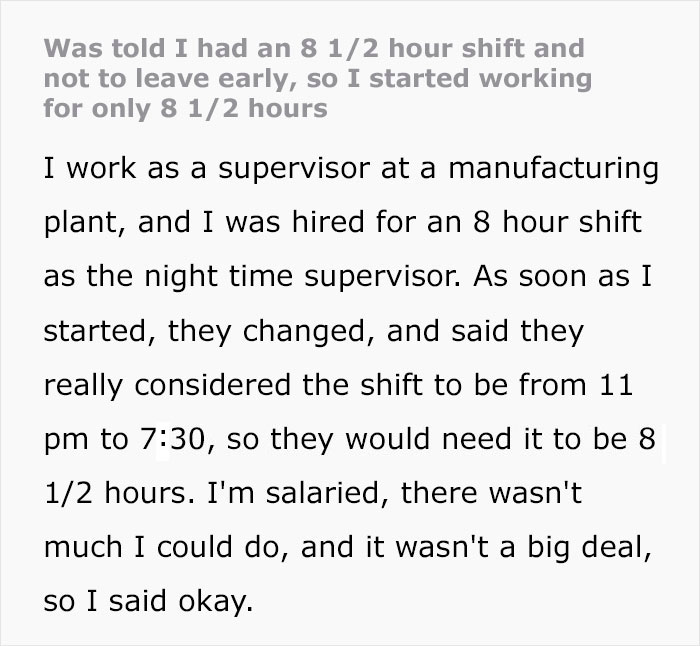
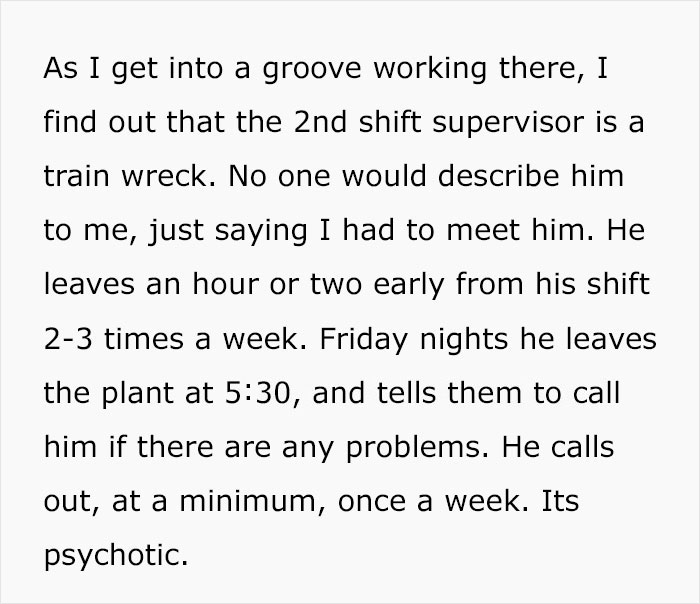
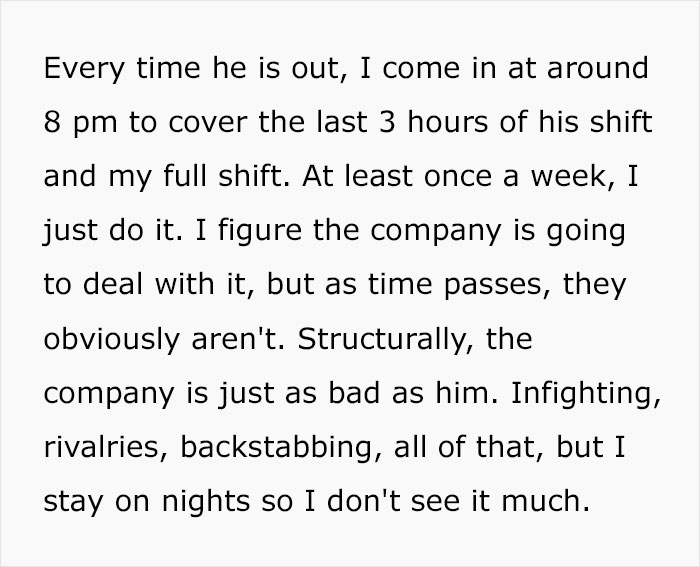
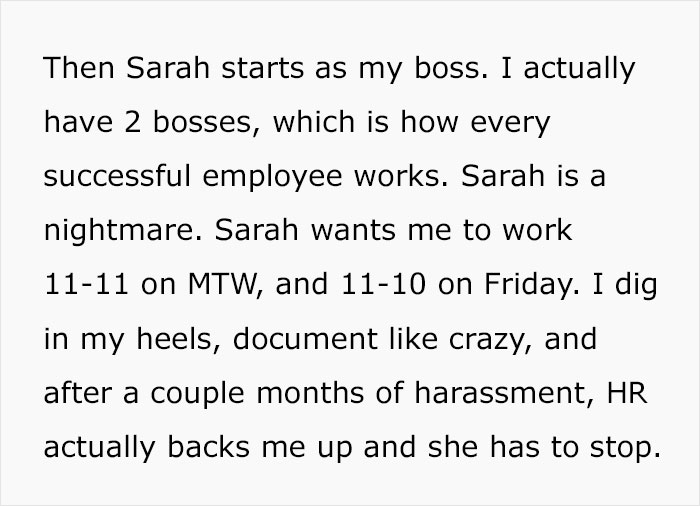
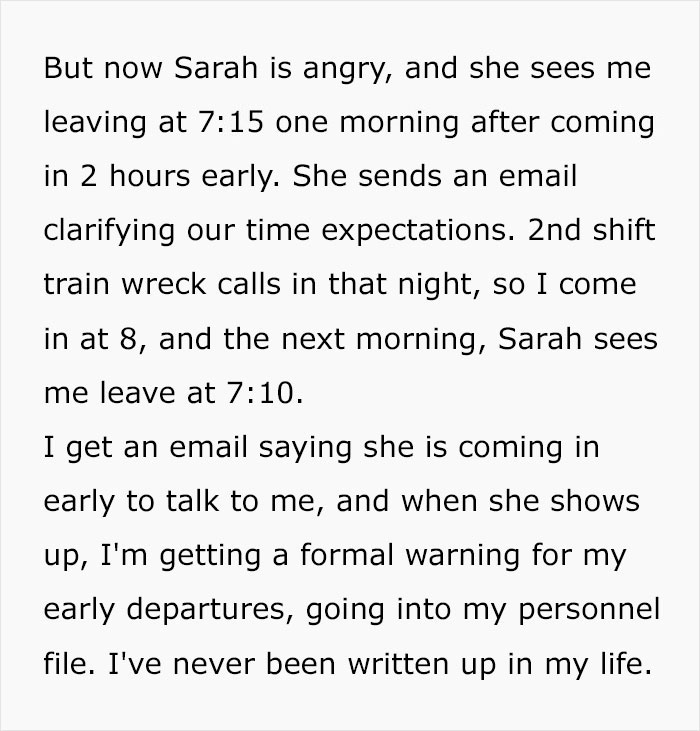
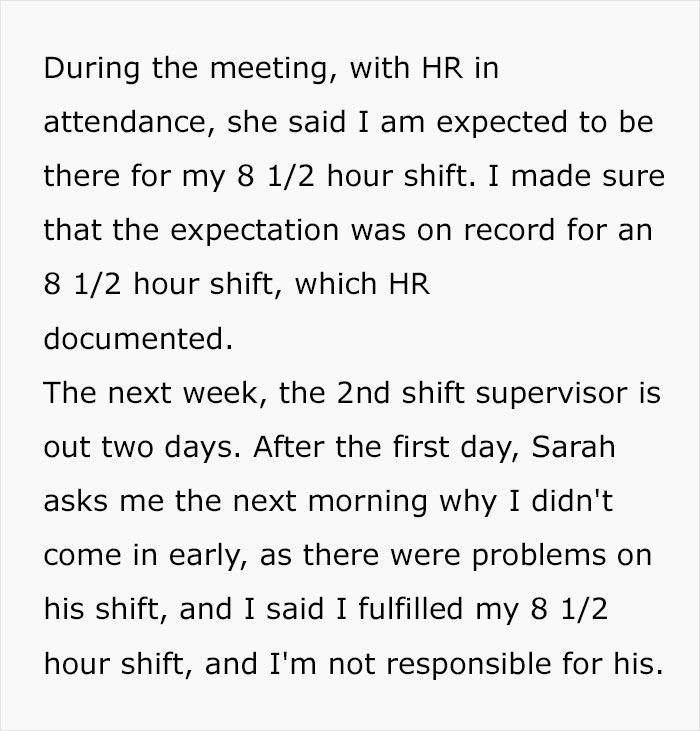
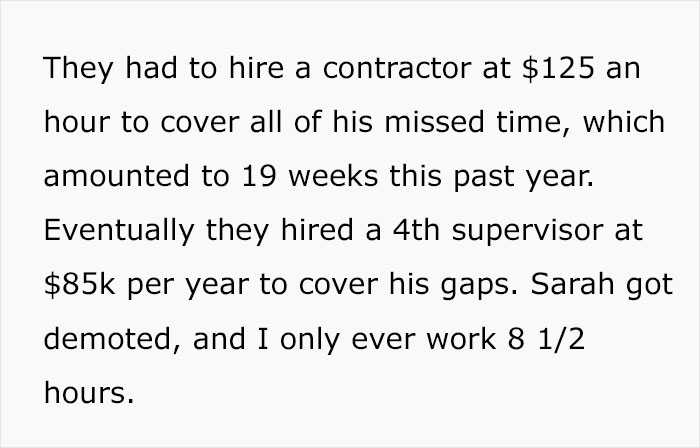
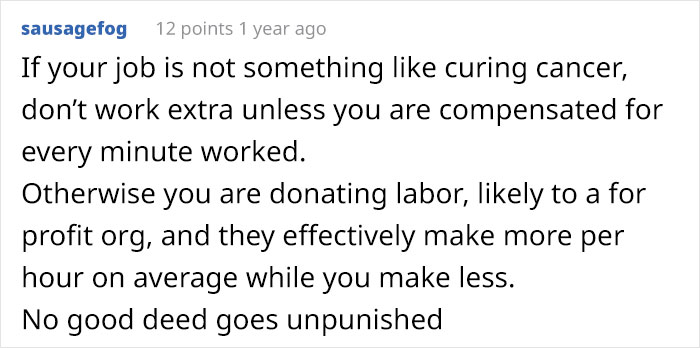


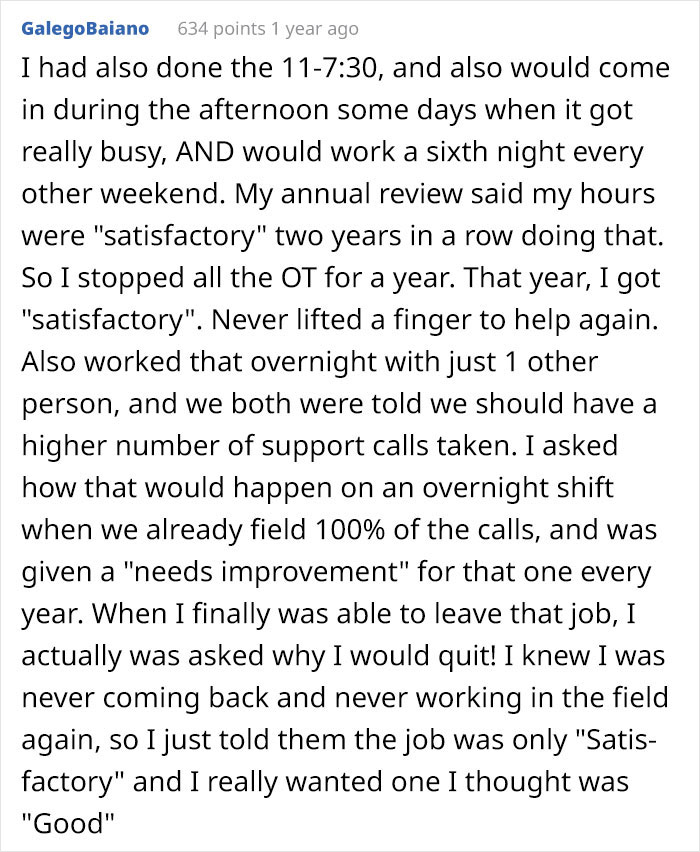




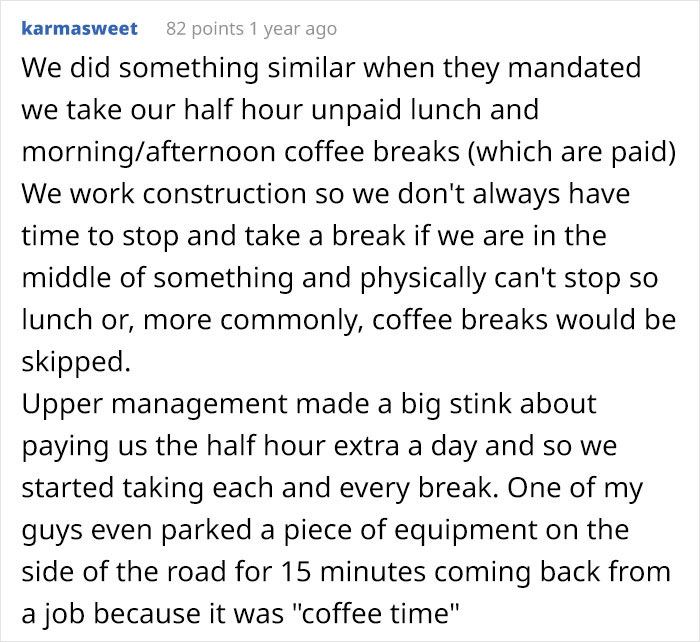













































168
132